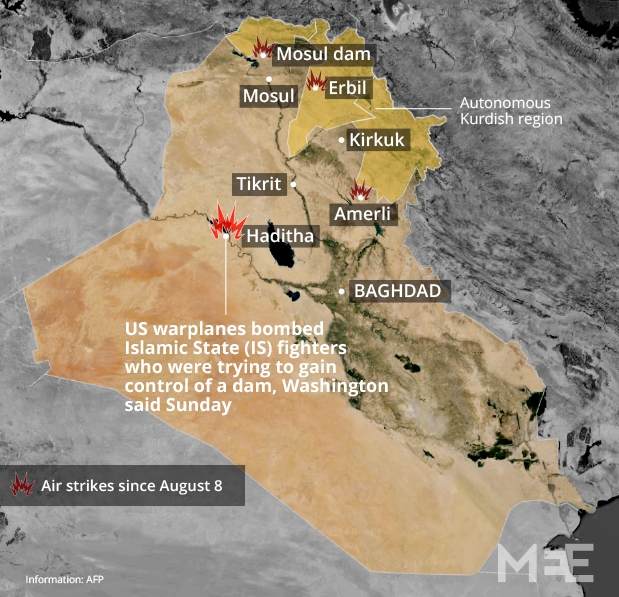Warned of Islamic State's 'house of blood', Iraqi politicians meet to form government

Iraq's parliament is to meet on Monday, under pressure to approve an inclusive government to win broad support against militants, as President Barack Obama prepares to unveil a strategy to defeat them.
The outgoing government has faced criticism over allegations that it alienated the Sunni Arab minority, helping to create the conditions that revitalised Sunni militants including those dubbing themselves Islamic State, who led an offensive that seized large swathes of southern Iraq in June.
Washington and the United Nations have repeatedly called on premier-designate Haidar al-Abadi to form a broad-based government.
Giving Sunnis a greater stake in power could help encourage them to join a fightback against militants.
The new UN human rights chief Prince Zeid Ra'ad al-Hussein said the atrocities IS had committed in areas under its control had already shown Sunnis that militant rule promised only a "house of blood."
The key parliament session is due to open at 1700 GMT and end with a vote on a new government line-up.
An expected meeting on Saturday was postponed until Monday, the day the deadline for government formations expires.
If the deadline expires, the President Fouad Marsoum will have the power to select the members of a new government.
There has still been no word from Abadi's office on the list to be put to MPs - the political horse-trading is expected to go right to the wire.
"I expect changes to occur until the final moments," said Samira al-Mussawi, an MP from Abadi's State of Law alliance.
She said there were persistent "differences over... positions such as deputy prime ministers and some of the key ministries, such as defence and interior."
Analysts also echoed this spirit of pessimism.
Matt Bradley, a correspondent with the Wall Street Journal, said he that Sunni and Shiite politicians had told him they will not announce a cabinet after Monday evening’s meeting.
Shiite militias stake claim
With Shiite militia playing a key role alongside the regular army in fighting the militants, one of their commanders is apparently seeking to turn military gains into political capital, which could complicate efforts to bring Sunnis on board.
Shiite lawmaker Ammar Toma told AFP that outgoing transport minister Hadi al-Ameri, who heads the Badr militia, which has close ties with Iran, is under consideration for the interior ministry.
This post would put him in charge of most of Iraq's security forces.
In the previous government, key security ministries were left vacant and run by acting ministers.
Toma said he still expects the political bargaining to be completed in time for the vote to go ahead as planned.
Obama to announce strategy
Obama, who made his political career opposing the war in Iraq and pulled out US troops in 2011, promised to unveil a long-awaited strategy on Wednesday to tackle IS in both Iraq and neighbouring Syria.
"I'm preparing the country to make sure that we deal with a threat” from IS, Obama said in an interview aired on Sunday on NBC's "Meet the Press.”
He said he would not announce the return of US ground troops to Iraq, and would focus instead on a "counter-terrorism campaign.”
"We are going to systematically degrade their capabilities. We're going to shrink the territory that they control. And ultimately we're going to defeat them," Obama said.
But the difficulties Washington faces were underlined by a report published by a British-based research group on Monday, which found that IS fighters are using captured US military-issue weapons supplied to other rebel groups in Syria by Saudi Arabia.
The study by Conflict Armament Research found that the militants disposed of "significant quantities" of US-made small arms including M-16 assault rifles and included photographs showing the markings "Property of US Govt.”
According to the report, these weapons are now being used by IS in ongoing fighting in Iraq and Syria.
'House of blood'
Prince Zeid, the first Muslim and Arab to serve as UN High Commissioner for Human Rights, said that IS had already shown the world what its rule would be like if it was left unchecked.
"It would be a harsh, mean-spirited house of blood," he said in his maiden speech to the UN Human Rights Council on Monday.
IS "has demonstrated absolute and deliberate disregard for human rights," Zeid said, stressing that "the scale of its use of brute violence against ethnic and religious groups is unprecedented in recent times."
The bloodshed continued on Monday when militants attacked the town of Dhuluiyah, north of Baghdad, which has held out against their assaults.
The Sunni tribal leaders of Salah al-Din province on Monday demanded that the government intervene immediately in Dhuluiyah by sending ground troops to back up Iraqi air force strikes.
Clashes and suicide bombings killed 18 people and wounded more than 50 across Iraq, police and a doctor said.
Arab foreign ministers agreed on Sunday to take "necessary measures" against the militants, but stopped short of explicitly backing the air campaign Washington launched in Iraq on 8 August.
Washington expanded its air strikes in the Sunni Arab heartland over the weekend, hitting IS targets around Haritha Dam, a key facility on the Euphrates Valley.
Iraqi troops and their militia allies sought to capitalise on the strikes, retaking the nearby town of Barwana from the militants, an AFP correspondent reported.
However, the victory was marred when a mortar round slammed into the town, wounding provincial Governor Ahmed al-Dulaimi as well as Abdulhakim al-Jughaifi, a local administrative official.
Stay informed with MEE's newsletters
Sign up to get the latest alerts, insights and analysis, starting with Turkey Unpacked
Middle East Eye delivers independent and unrivalled coverage and analysis of the Middle East, North Africa and beyond. To learn more about republishing this content and the associated fees, please fill out this form. More about MEE can be found here.





